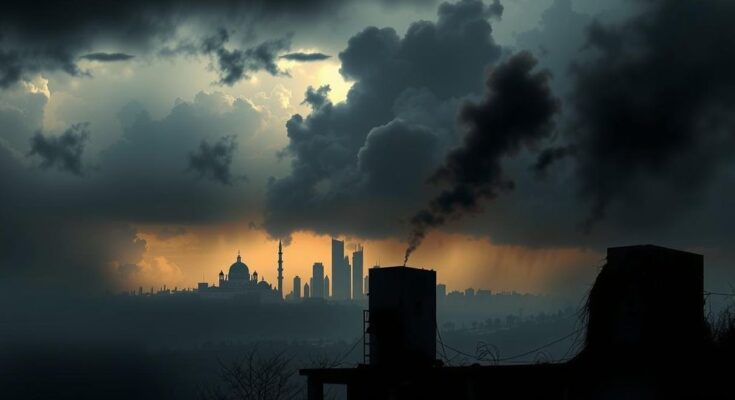Intensified fighting between DR Congo’s army and M23 rebels near Goma has led Western nations to advise evacuations. The UN reports over 400,000 people displaced this year due to escalating violence. International mediation attempts are faltering, while the humanitarian crisis deepens amidst ongoing military operations and civilian suffering.
The Democratic Republic of Congo (DR Congo) is experiencing intensified conflict as the army and M23 rebels engage in fierce clashes outside Goma. In response, Western nations, including the United States, United Kingdom, and France, have advised their citizens to evacuate the city amid warnings of an escalating situation. The ongoing conflict has resulted in significant territorial gains for M23, backed by Rwandan troops, leading to a humanitarian crisis impacting over one million residents in the region.
Efforts to resolve the crisis through peace negotiations have failed, exacerbating instability in eastern DR Congo. Recent reports indicate that the UN has expressed grave concern over the safety of civilians, with over 400,000 people displaced in 2023 alone. Matthew Saltmarsh, a spokesman for the UN refugee agency, highlighted the urgent need for humanitarian assistance as families flee conflict zones seeking refuge in Goma.
The UN Secretary-General, Antonio Guterres, has voiced alarm regarding the resurgence of hostilities, emphasizing the dire consequences for civilians and potential risks for broader regional conflict. On the ground, clashes intensified in locations near Goma and Sake, prompting military responses from the Congolese army, including helicopter strikes against M23 positions.
Recent developments indicate that military leadership in the region is under severe strain, particularly following the death of North Kivu’s military governor. Amid these heightened tensions, Congolese President Felix Tshisekedi has convened a defense council to address the precarious situation. International diplomatic efforts to mediate the conflict remain stalled, with attempts to convene talks with Rwandan officials encountering difficulties.
In light of the escalating violence in the region, urgent international intervention may be necessary to prevent further deterioration of the humanitarian situation. The historical context of the region’s conflicts plays a crucial role in understanding the current dynamics, as past ceasefires have frequently collapsed, contributing to a cycle of violence and instability that has lasted for decades.
The Democratic Republic of Congo has faced prolonged periods of conflict, particularly in its eastern provinces, where various armed groups, including the M23 rebel movement, have flourished. The region’s instability is complex, involving historical ethnic tensions and the influence of neighboring countries such as Rwanda. Efforts to mediate conflicts have often failed, leading to disastrous humanitarian consequences, including widespread displacement, loss of lives, and a persistent struggle for safety among civilians. The current situation is emblematic of the ongoing challenges faced by both the Congolese government and international peacekeeping forces.
The situation in the Democratic Republic of Congo remains critical, with escalating clashes between government forces and M23 rebels causing significant humanitarian distress. The warnings from Western nations for their citizens to leave Goma reflect the gravity of the unfolding crisis. In light of the UN’s alarming reports on civilian displacement and suffering, the need for comprehensive diplomatic efforts and humanitarian support becomes increasingly urgent to stabilize the region and protect vulnerable populations.
Original Source: thepeninsulaqatar.com




